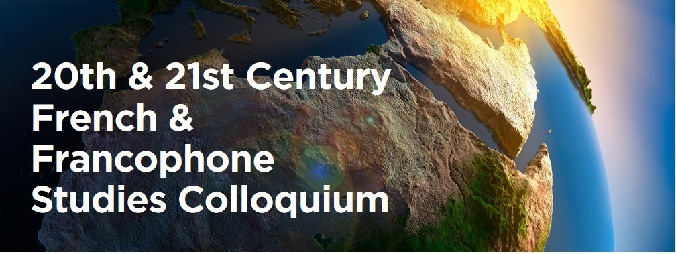Modern Languages and Literatures, Department of

20th and 21st Century French and Francophone Studies International Colloquium
Date of this Version
4-2020
Document Type
Presentation
Citation
Kim, Annabel (2020). "Writing after the Human: Marie Darrieussecq’s and Anne Garréta’s Posthumanisms," 20th & 21st Century French and Francophone Studies International Colloquium, University of Nebraska-Lincoln, March 26-28, 2020. https://digitalcommons.unl.edu/ffsc2020/
DOI 10.32873/unl.dc.ffsc.025
Abstract
In our current moment of climate catastrophe and impending planetary doom, the posthuman seems like a harbinger of an all too imminent reality (felt especially keenly in the age of COVID-19). In the twenty-first century, the humanities, grappling with the multifarious failures and excesses of traditional humanism, are attempting to abandon the anthropocentric epistemologies and practices that have characterized Western thought and culture and to create new models for thinking the world—models that are able to accommodate the nonhuman and welcome other forms of life and matter as objects of focus, moving thus from an imperialist vertical mode of conquering the world to a horizontal one of egalitarian relation between actors hybridized through their mutual entanglement, caught up in one large network, to draw upon thinkers like Bruno Latour and Donna Haraway, to name just two of the major names associated with new materialisms, which we could describe as the contemporary response to the anthropocentric humanisms of preceding centuries.
Literary studies have, in their engagement with posthumanist theoretical and critical approaches, largely dealt with the ways in which literature represents posthumanism, examining characters and plots that decenter the human, which accounts for the way science fiction dominates as a privileged object of literary scholars invested in posthumanism. In these instances, literature is taken as the site for case studies that problematize posthumanism in interesting and valuable ways: take, for example, Kazuo Ishiguro’s Never Let Me Go, a popular text for thinking through questions of embodiment and consciousness and the boundaries of human-ness through its representation of human cloning; or the way critic Katherine N. Hayles analyzes science fiction texts by authors such as Philip Dick. Less taken up, however, is the way in which literature itself constitutes a posthuman experience. Certainly, insofar as posthumanism deals with questions of technology and we humans’ relation to our various technologies, literature, by employing hypertextuality or responding to things like the Internet and social media, calls attention to itself as the site of posthuman experience, recasting literature as something other than the familiar printed volume that grounds the long tradition of letters, thus raising the possibility for other forms that literature’s materiality might assume.
Even here, though, in what is called E-literature, or literature that is “born digital,” created within an electronic environment, taken by some as the new vanguard of literature—literature’s new wild west as it navigates the boundary-pushing that the internet entails—literature remains firmly a human domain, as opposed to, say, the visual and plastic arts, where we can find plenty of examples of animal artists—chimpanzees, elephants, dolphins, beluga whales, and rabbits, for instance, are all species that have been successfully trained to draw or paint. And while Koko the gorilla and dolphins might have their capacity for linguistic expression and comprehension acknowledged, they are certainly not considered authors in the same way that even the lowest-brow of authors or self-publishing authors are. What I would like to examine here, today, is the way literature, despite remaining one of the most anthropocentric artifacts that the human species continues to produce—is able to envision and make space for its own transition to being a process or production that is posthuman in the sense of non-human—beyond human, outside the human.
In other words, I want to apply to literature posthumanism’s most valuable quality—that is, its capacity to critique a fetishistic, naturalizing, essentializing, transhistorical conception of the human and human exceptionalism. The posthumanist critique that we are readily able to bring to bear on the humanities in general has not yet pierced through to our notion of literature as anything but a human enterprise, as signaled by the perduring quality of literariness as a concept. But it is literature itself that equips us to be able to think, truly, a posthuman literature. Literature, as a human product, is able to transcend the human, as becomes clear in recent works by the contemporary French authors Marie Darrieussecq and Anne Garréta, who, in Notre vie dans les forêts and Dans l’béton, respectively, address posthuman readers, such forms of address compelling us to consider the possibility of a literature without humans, just as we, in the face of our own manufactured climate catastrophe, are forced to consider the possibility of a planet without us.
Included in
Comparative Literature Commons, French and Francophone Literature Commons, Other French and Francophone Language and Literature Commons


Comments
Copyright © 2020 Annabel Kim.